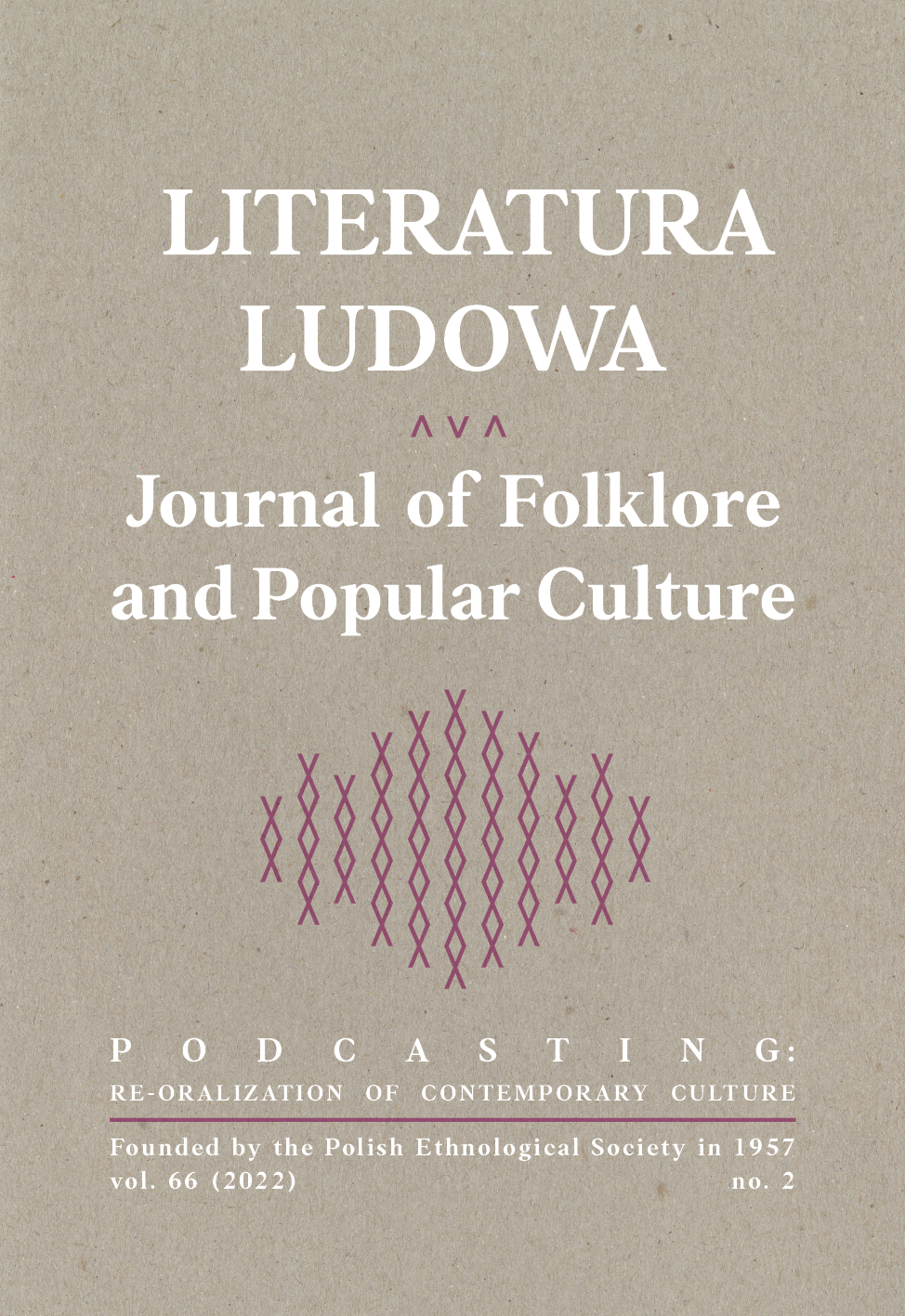Antifascist Mothers and Folk Healers: Queer Reinterpretations of Polish and Regional Cultural Archetypes in Familia
DOI:
https://doi.org/10.12775/LL.2.2022.003Keywords
audio series, familia, folk healers, nationalism, podcast, Polish mother, queer, theatreAbstract
The article serves as an analysis of Familia, a Polish independent fiction podcast from 2020 produced by the Teraz Poliż theatre as a response to increase of state supported homophobic propaganda in the recent years. By pointing out similarities and differences between the podcast in question and mainstream Polish audio series, as well as drawing comparisons to popular globally distributed independent audio fiction produced in English, the author aims to prove the unique position of Familia as a sole representative of a politically conscious podcast drama presenting a specifically Polish perspective on queer emancipation. The author then proceeds to analyse the narrative content of the podcast, presenting the ways in which the story plays with elements of traditional, Polish national identity, reframing them via a radical lens as potential symbolic tools for LGBTQ+ emancipation and antifascist resistance in everyday life, while at the same time warning of the limited scope of use for such tools.
References
Barkun, M. (2003). A Culture of Conspiracy: Apocalyptic Visions in Contemporary America. Berkeley: University of California Press.
Berry, R. (2006). Will the iPod Kill the Radio Star? Profiling Podcasting as Radio. Convergence: The International Journal of Research into New Media Technologies, 12(2), 143-162. https://doi.org/10.1177/1354856506066522
Davies, N. (1972). White Eagle, Red Star: The Polish-Soviet War 1919-1920. London: Random House UK.
Drucker, P. (2015). Warped: Gay Normality and Queer Anti-capitalism. Leiden: Brill Academic Publishers.
Eco, U. (1995, June 22). Ur-Fascism. New York Review of Books. http://www.nybooks.com/articles/1856
Fiske, J. (1993). Power Plays: Power Works. London: Verso.
Gawrońska-Piotrowska, A. (2021). Serial audio w Polsce jako nowoczesna forma słuchowiska radiowego. Kultura – Media – Teologia, 48(4), 127–156. https://doi.org/10.21697/kmt.48.6
Hammersley, B. (2004, 12 February). Audible Revolution. The Guardian. https://www.theguardian.com/media/2004/feb/12/broadcasting.digitalmedia
Imbierowicz, A. (2012). Matka Polka w defensywie? Przemiany mity i jego wpływ na sytuację kobiet w polskim społeczeństwie. Ogrody Nauk i Sztuk, 2(2), 430–442. https://doi.org/10.15503/onis2012.430.442
Jamin, J. (2014). Cultural Marxism and The Radical Right. In: P. Jackson, A. Shekhovstov, (Eds.), The Post-War Anglo-American Far Right: A Special Relationship of Hate (pp. 84–103). Hamphire: Palgrave Macmillan.
Niedurny, K. (2020). Chłopcy na ziółkach. Dwutygodnik.com, 294(11). https://www.dwutygodnik.com/artykul/9214-chlopcy-na-ziolkach.html
Sadanowicz, E. (2018). Szeptuchy jako specyficzne zjawisko znachorskie na Podlasiu. Pogranicze. Studia Społeczne, 32, 190–207. https://doi.org/10.15290/pss.2018.32.13
Spinelli, M., Dann, L. (2019). Podcasting: The Audio Media Revolution. New York: Bloomsbury Publishing.
Tabak, W. (2021, luty). Faszyści i Czarownice. Didaskalia [wydanie internetowe], 161. https://didaskalia.pl/pl/artykul/faszysci-i-czarownice
Włodarczyk, A., Tymińska, M. (2015). Cultural differences: Polish fandom of Welcome to Night Vale, Transformative Works and Cultures [online edition], 19. https://doi.org/10.3983/twc.2015.0591
Weinstock, J. (20 18). Introduction. In: J. Weinstock (Ed.), Critical Approches to »Welcome to Nigh Vale«: Podcasting between Weather and the Void (pp. 1–22). Cham: Palgrave Macmillan.
Weber, E. (2014). Podlasie – gdzie religia spotyka magię. Kultury Wschodniosłowiańskie – Oblicza i Dialog, 4, 209–215. https://doi.org/10.14746/kw.2014.4.18
Downloads
Published
How to Cite
Issue
Section
License
Copyright (c) 2022 Michał Pokrowiecki

This work is licensed under a Creative Commons Attribution-NoDerivatives 4.0 International License.
1. The authors give the publisher (Polish Ethnological Society) non-exclusive license to use the work in the following fields:a) recording of a Work / subject of a related copyright;
b) reproduction (multiplication) Work / subject of a related copyright in print and digital technique (ebook, audiobook);
c) marketing of units of reproduced Work / subject of a related copyright;
d) introduction of Work / object of related copyright to computer memory;
e) dissemination of the work in an electronic version in the formula of open access under the Creative Commons license (CC BY - ND 3.0).
2. The authors give the publisher the license free of charge.
3. The use of the work by publisher in the above mentioned aspects is not limited in time, quantitatively nor territorially.
Stats
Number of views and downloads: 693
Number of citations: 0



